The A27L Centaur Mark IV Tank
This British Centaur Mark IV tank can be found at the French Tank Museum in Saumur in the Loire Valley. The Museum is called Musée des Blindés ou Association des Amis du Musée des Blindés, 1043, route de Fontevraud, 49400 Saumur, France www.museedesblindes.fr .
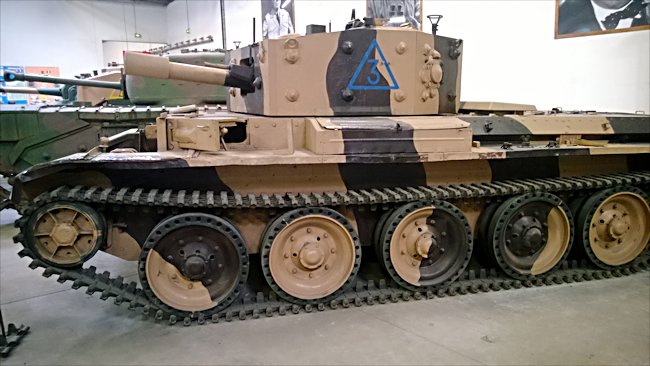
The British Centaur Mark IV Tank in the French Tank Museum in Saumur
The Crusader tank replacement
This 'cruiser' tank was fitted with a 395 hp liberty engine as a solution to the lack of Merlin engines that were requiored for fighter aircraft. It could travel at a top speed of 43 km/h which was better than the Churchill tanks's 24.8km/h. The Merlin engin was later fitted in the Cromwell tank. It had a 75mm ROQF Mk V gun and 76mm front armour. It had a 7.92mm Besa Machine Gun housed next to the main gun in the turret. It needed a crew of five and weighed 28.8 tonnes. In 1943, most Centaur I were converted to IIIs. The Centaur Tank differed from the Cromwell Tank mainly by having a different slower engine. They were both designed to replace the Crusader Tank. 950 Centaur tanks were built compared with 3,066 Cromwell tanks.
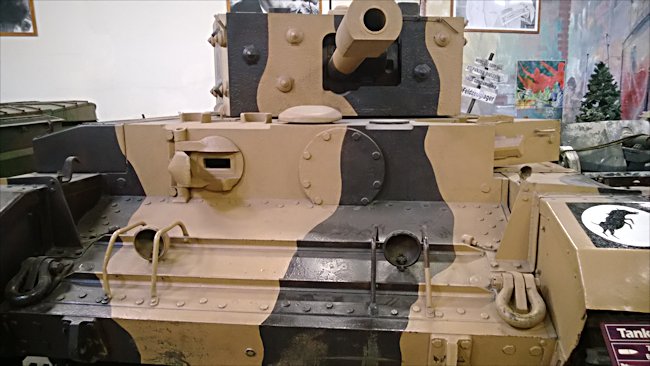
The British Centaur Mark III Tank was mainly used for training. The MkIV went to war on D-Day
Only a few Centaur tanks were built. Production started in June 1942. A later version the Centaur Mark IV was equipped with a 95mm howitzer for infantry close support purposes and used on the D-Day landings by the Royals Marines. Some Centaur tank turrets had the degrees of a compass painted around them in white. The 360° marker was at the rear and the 180° marker that indicated South, was at the front. These were added to help the centaur lay down covering fire while still on the landing craft as they approached the beach. The Royal Marine spotter would call out the degree and distance to the target and the tank gunner would fire blind over the front of the landing craft ramp.
There are only four Centaur tanks in existence. You can see a Centaur Mark I in the Tank Museum, Greek Army Armored Training Center, Avlona, near Athens, Greece. There is a Centaur IV at Benouville in Normandy near the Pegasus Bridge and there is another Centaur IV that used to be an armoured dozer during the D-Day landings, at Hermanville-sur-mer. I do not count the Centaur tanks that have been discovered at the bottom of the river Solent near the Isle of Wight by Maritime archaeologists. They were being carried on a landing craft which capsized and lost its cargo as it was heading for the D-Day landings in 1944.
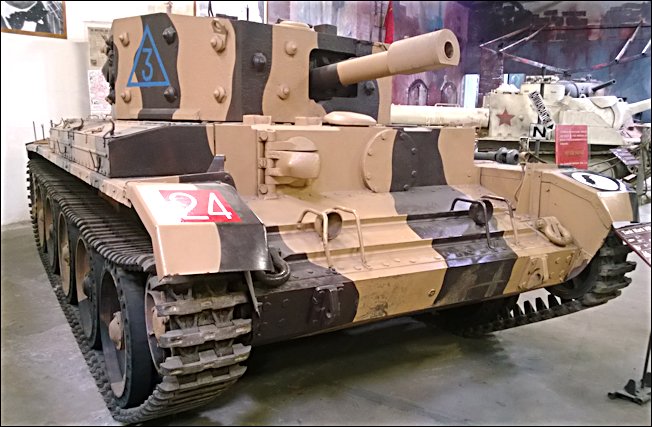
There was very little sloping armour incorporated in the design of the British Centaur Mark III Tank. It had a slightly lower profile than the M4 Sherman tank.
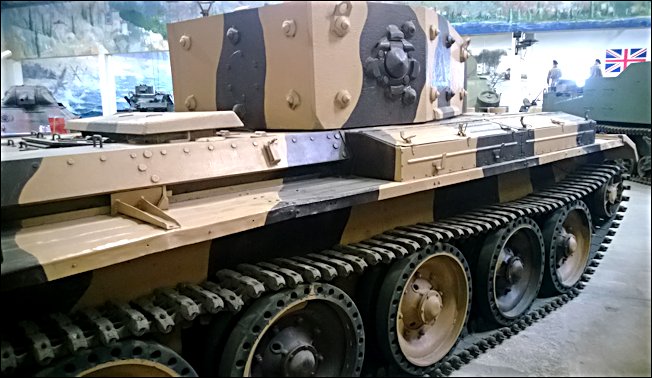
Rear view of the bolted armour plate on the turret of a British Centaur Mark IV Tank. Notice the equipment boxes fixed above the track mud guard. Access to the track wheels was easy compared with most German tanks of the same age.
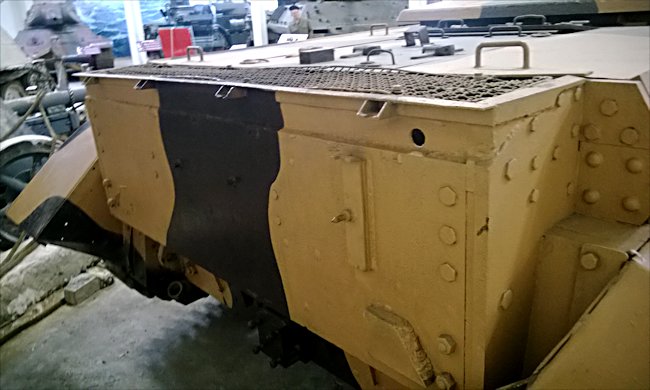
Rear track mudguards, engine compartment hatch and back box on a British Centaur Mark IV Tank
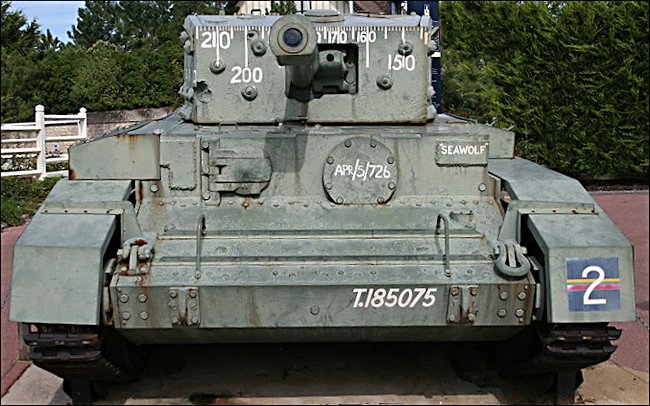
Centaur IV at Benouville in Normandy near the Pegasus Bridge
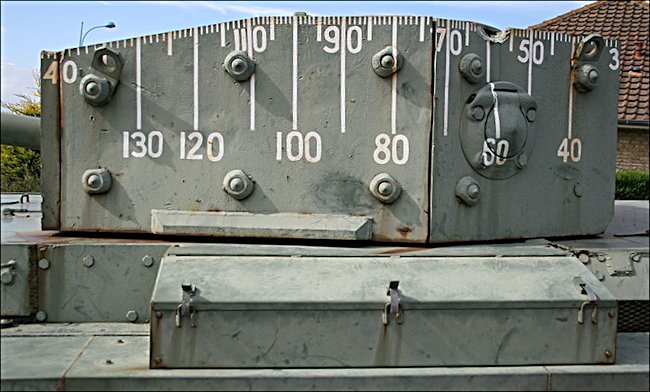
Centaur IV at Benouville in Normandy near the Pegasus Bridge
Where can I find other preserved Centaur Tanks?
- Centaur Mk I - 2nd Lancers Regiment Barracks, Calcada da Ajuda, Lisboa, Portugal
- Centaur Mk I - x2 Portuguese Army Cavarly School Museum, Santarem, Portugal
- Centaur Mk I - Campo Militar CMSM, Santa Margarida da Coutada, Portugal
- Centaur Mk I - Armoured Weapons Museum, (Muzeum Broni Pancernej w Poznaniu) Poznan, Poland
- Centaur Mk I - Hellenic Army Armor Museum, Armor Training Center, Avlona, Athens, Greece
- Centaur Mk III - Musée des Blindés, Saumur, France
- Centaur Mk IV - Cobbaton Combat Collection, Devon, England
- Centaur Mk IV - Memorial Pegasus Bridge Museum, Ranville, Normandy, France
- Centaur Mk IV (A24 Cavalier Turret) - Hermanville-sur-Mer, Sword Beach, Normandy, France
- Centaur Mk III - 2nd Lancers Regiment Barracks, Calcada da Ajuda, Lisboa, Portugal
- Centaur Dozer - Tank Museum, Bovington, Dorset, England
- Centaur Dozer - x2 Armoured Corps Museum, Ahmednagar, Maharashtra, India
- Centaur Restoration Mk I - Harvey Gillatt, East Retford, Nottinghamshire, England
- Centaur Restoration Mk VII - Kevin Powles Collection, England
- Source - Pierre-Oliver Buan - http://the.shadock.free.fr/Surviving_Panzers.html
WW2 British Tank books

